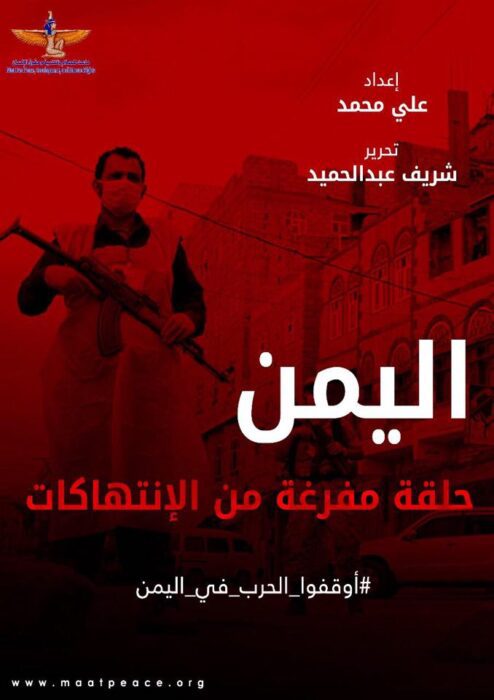Okeil: The Houthis' rejection of ceasefire initiatives exacerbates the dire situation of human rights in Yemen
Sherif Abdel Hamid: 20 million Yemenis are suffering from food insecurity due to the conflict
Ali Muhammed: More than 2 million mines have been planted by the Houthis since the beginning of the conflict, claiming the lives of over 20,000 Yemenis
Maat for Peace, Development, and Human Rights launched today, March 13, 2021, a human rights campaign entitled “Stop the War in Yemen.” The campaign, which will last for a week, aims to highlight human rights violations in Yemen, introduce the international community to the crimes of the Houthi terrorist militia, and call on the international community to put pressure on all parties to the conflict to stop the war, which is entering its seventh year this year, in the absence of signs indicating the looming end to this conflict.
On the sidelines of the first day of the campaign, Maat released a report entitled “Yemen ... a Vicious Circle of Violations.” The report confirmed that the number of fighting lines in Yemen has increased from 36 in 2019 to about 50 in early 2021, the latest of which was the unjustified escalation by the Houthis in Marib, northern Yemen, which threatens the lives of thousands of civilians, and causes the displacement of about 800 thousand persons, as a direct consequence of the escalation of hostilities by the Houthi militia. In 2020, the Houthis have reportedly committed about 1,700 violations against civilians in areas under their control; as 712 civilians were killed, including 122 children and 66 women, and about 940 civilians, including 247 children and 113 women, were injured. Since the beginning of the conflict, the Houthi militia has recruited more than 30,000 children, including 4,600 children, in 2020 alone, regardless of the ban imposed on child recruitment according to international humanitarian law and international treaties and norms.
Ayman Okeil, president of Maat, called on all parties to the conflict in Yemen and their international sponsors to mobilize immediately in order to put an end to the conflict that threatens the lives of innocent civilians. Okeil added that the lack of response, or the slowdown thereof, to the call to stop the war in Yemen, especially in light of the spread of the Coronavirus pandemic, makes civilians more vulnerable to this health crisis, stressing that ending the war in Yemen must be given top priority and that urgent humanitarian aid must be provided to vulnerable civilians in different conflict areas. Okeil affirmed that the Houthis remain intransigent and reject all peace initiatives and US cease-fire plans to end the war, exacerbating the miserable situation of the human rights situation in Yemen. Notably, the latest of such plans was submitted by the US special envoy for Yemen, Timothy Lenderking; however, it was rejected by the Houthis on Friday, March 12, 2021.
For his part, Sherif Abdel Hamid, director of the Research and Studies Unit at Maat, said that Yemen faces the world's worst man-made humanitarian crisis, with more than 24 million Yemenis out of 30 million in critical need of protection and assistance, and 20 million are suffering from food insecurity. Some UN bodies believe that 5 million Yemenis are on the brink of famine, however, these statistics are likely to worsen if the conflict continues. Abdul Hamid added that the areas under the Houthis control have suffered from about 100,000 violations from the beginning of the conflict in September 2014 until the end of 2020, as more than 112,000 were killed as a result of direct hostilities in Yemen, among them 12,000 civilians, the majority of whom were women, children and the elderly. Nearly 13,000 civilians were injured due to the conflict, including 3,000 children, and 1,400 women.
Ali Muhammad, a researcher at Maat, also affirmed that targeting civilians in non-international armed conflicts is inconsistent with Common Article 3 of the Geneva Conventions of 1949, which grants special protection to people not involving in the hostilities, including members of the armed forces whose weapons have been taken away. Muhammad pointed out that more than 2 million mines have been planted by the Houthis since the beginning of the conflict, specifically from March 2015 to January 2021, claiming the lives of over 20,000 Yemenis.
To get a copy of the report, please complete the following form











